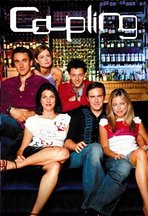Coupling
UK Televisions Series written by Steven Moffat
I probably would have enjoyed Commedia dell’arte, given the opportunity to understand Italian. For that matter, give me French and I’d have gotten a kick out of a good Comedy of Manners. At least, Moliere has been translated into English and Oliver Goldsmith wrote in English. Of course, all those works have original settings in times gone by. Imaginative theatrical directors will transplant the action to modern day, but that often plays as clever more than apropos. If only people were still writing comedies that made fun of modern social behavior. Ah, yes, the television situation comedy.
From The Honeymooners and I Love Lucy through Friends, Seinfeld, and The Big Bang Theory, it’s easy to perceive the half hour television comedy as a form that arose in the early 1950s and has evolved ever since. In reality, we erected barriers of time and space between performers and audience while shortening the duration, but essentially we work with stock characters playing through familiar situations for laughs. We like the jokes our ancestors enjoyed.
Steven Moffat has found great fame with Sherlock and Doctor Who. His horror mini-series, Jekyll, may become a major Hollywood film. Before all that, Moffat created Coupling, a British sitcom that generally got described as the BBC Friends, despite the key difference that they did not live in the same building. They were older and the characters don’t really map onto one another across the two shows. And sex proved to be a much greater factor in the Coupling plot lines.

Both shows felt like
a breath of fresh air when they started and both shows overstayed their welcome. But we’re here to praise Coupling, which it fully deserves. More than any show that I can think of, the actors inhabited their roles to such an extent that I can’t imagine anyone else playing them. When I think of Commedia dell’arte, I imagine portrayals that are inextricably linked to each actor, but also grant a freedom within each role to improvise. Nowadays, when we think of improvisation, we expect a breakdown of that fourth wall between stage and seats, but trickier is that living portrayal where acting choices seem so natural that we make assumptions about where the acting begins and ends.And that’s where the writing shines, also. Creating characters to building seamless dialogue, Moffat has a certain deft touch that feels almost Moliere-esque. In Sherlock, we accept the outlandish portrayal of the protagonist “thinking” because it blends with the situation and the surroundings well enough that we grant the flight of fancy.
More so than any other dramatic form, comedy grants us the freedom to ignore the past. The moments that we memorialize are distinct, practically living outside of time. We don’t tie them to any other emotion because the laugh, the pleasure, carries enough power to overwhelm the guilt and pain and sadness that power so much else of our shared experiences driving our drama.
What’s it all about?
You’ve Got to Check This Out is a blog series about music, words, and all sorts of artistic matters. It started with an explanation. 144 more to go.
New additions to You’ve Got to Check This Out release regularly. Also, free humor, short works, and poetry post irregularly. Receive notifications on Facebook by friending or following Craig.
Images may be subject to copyright.